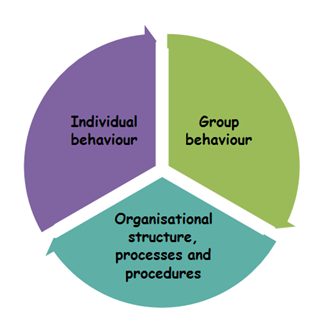Scope of Organizational Behaviors

The scope of Organizational Behavior (OB) is broad and encompasses various aspects of how individuals, groups, and structures interact within an organization. Here's a detailed breakdown of its scope:
1. Individual Behavior
- Personality: Examines how individual traits and characteristics influence behavior at work.
- Attitudes and Job Satisfaction: Studies how employee attitudes (e.g., job satisfaction, organizational commitment) affect performance and retention.
- Perception: Looks at how individuals interpret their environment and the impact this has on their work behavior.
- Learning and Development: Focuses on how employees acquire skills and knowledge and the effect of training and development on performance.
- Motivation: Analyzes what drives individuals to work towards goals and how motivational theories can be applied to enhance performance.
2. Group Behavior
- Group Dynamics: Investigates how people behave in groups, including the formation of groups, group cohesion, roles, and norms.
- Teamwork: Studies how teams are formed, how they function, and how team performance can be improved.
- Communication: Explores the processes of communication within groups and the barriers to effective communication.
- Leadership: Examines different leadership styles and their impact on group behavior and performance.
- Power and Politics: Looks at how power dynamics and political behavior influence decision-making and relationships within groups.
- Conflict and Negotiation: Studies the sources of conflict within groups and strategies for conflict resolution and negotiation.
3. Organizational Structure
- Organizational Design: Investigates different types of organizational structures (e.g., hierarchical, flat, matrix) and their impact on behavior.
- Work Processes: Examines how tasks and workflows are organized and their impact on efficiency and effectiveness.
- Roles and Responsibilities: Defines how roles and responsibilities are distributed within the organization and their effect on behavior and performance.
4. Organizational Culture
- Values and Beliefs: Studies the core values and beliefs that shape organizational culture and behavior.
- Norms and Practices: Looks at the unwritten rules and standard practices that influence how work is done.
- Cultural Change: Explores how organizational culture evolves over time and how it can be managed or changed.
5. Leadership and Management
- Leadership Styles: Examines various leadership styles (e.g., transformational, transactional, servant leadership) and their effects on the organization.
- Management Practices: Studies the impact of different management practices on employee behavior and organizational outcomes.
- Decision Making: Analyzes decision-making processes at individual, group, and organizational levels.
6. Change Management
- Change Processes: Studies the processes and stages of organizational change and how to manage them effectively.
- Resistance to Change: Looks at why employees resist change and strategies to overcome resistance.
- Innovation: Examines how organizations can foster innovation and creativity among employees.
7. Organizational Development
- Interventions: Focuses on planned interventions aimed at improving organizational effectiveness and employee well-being.
- Assessment and Diagnosis: Studies methods for assessing organizational health and diagnosing problems.
8. Work Environment and Organizational Climate
- Physical Environment: Examines how the physical workspace impacts employee behavior and performance.
- Psychosocial Environment: Looks at the psychological and social aspects of the work environment and their effect on behavior.
9. Human Resource Practices
- Recruitment and Selection: Studies how the processes of hiring and selecting employees impact organizational behavior.
- Performance Management: Examines how performance appraisal and management systems influence behavior and outcomes.
- Compensation and Benefits: Looks at how rewards and compensation systems affect motivation and performance.
The scope of Organizational Behavior is comprehensive, addressing a wide range of factors that influence how people behave within organizations. By understanding these elements, organizations can create better work environments, improve employee satisfaction and performance, and achieve organizational goals more effectively.
Thank you,
